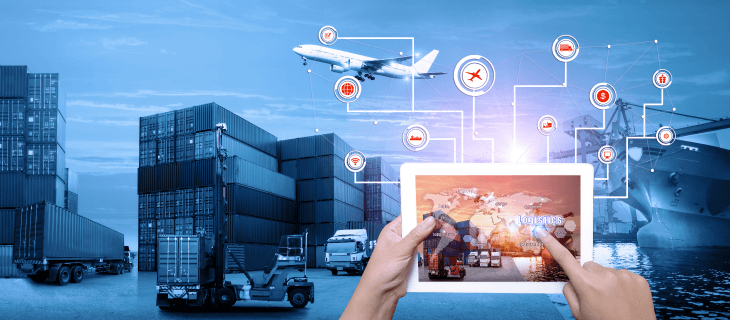- Digital technology is revolutionizing the logistics industry, enhancing visibility, connectivity, and flexibility in freight forwarding operations.
- These advancements simplify processes and address the complexities of the fragmented industry.
- However, strategic challenges arise, requiring careful management of priorities, investments, customer needs, and capacity due to the complex and fragmented nature of the industry.
The Drivers Behind Digitalisation in Freight Forwarding
- The driving factors behind digitalization in freight forwarding stem from the increasing globalization and complexity of supply chains, alongside rising customer expectations for faster lead times, expanded services, and customized offerings.
- Digitalisation in freight forwarding brings various benefits, including:
Visibility and Transparency
-
Digitalisation offers the advantage of getting up-to-date information on the entire supply chain in real-time.
-
By using digital platforms and tracking technologies, freight forwarders can keep track of shipments and provide customers with accurate updates.
-
This improved visibility helps with better planning, proactive issue resolution, and timely decision-making.
Speed and Efficiency
- Digitized processes enable smooth and fast transfer of goods, quick identification and resolution of supply chain problems, and automation of repetitive tasks, leading to reduced errors and increased efficiency.
- Automating back-office and operational tasks can result in cost reductions of up to 40%.
Scalability
- Digitalization offers equal opportunities for freight forwarders of all sizes to achieve more with fewer resources.
- Automation of back-office tasks optimizes human resource utilization, enabling digital forwarders to expand services and reach broader geographic areas more easily.
Flexibility and Agility
- Digitalisation in freight forwarding allows for real-time responses to changes in demand, supply, or disruptions through planning.
- It enhances end-to-end visibility, enabling prompt issue identification and implementation of effective work around.
- Improved connectivity among freight forwarders, carriers, and customers enhances responsiveness to disruptions.
Improved Customer Experience
- Providing value-added services, on-time delivery, and quick responsiveness are key to excellent customer service in freight forwarding.
- Digital technologies enable easy access to search, book, modify, and track shipments.
- Automation expedites the calculation and issuance of quotes, reducing the time it takes to serve customers.
Sustainability
- Freight transportation accounts for 8% of global emissions and is expected to become the highest emitting sector by 2030, according to the Intergovernmental Panel on Climate Change (IPCC).
- Digitalisation in freight forwarding also plays a significant role in promoting sustainability in freight forwarding.
- By reducing paper-based processes and adopting electronic documentation, it helps minimize waste and contributes to environmental preservation.
- Digitalisation has the potential to help freight forwarders monitor emissions and identify areas where they can be reduced in freight forwarding.
- Big data enables better decision-making and optimisation for more environmentally friendly operations and improving sustainability in logistics.
Conclusion:
Digitalisation in freight forwarding is essential for forwarders to streamline operations, improve visibility, leverage data, and foster collaboration, leading to operational excellence, enhanced customer experiences, and new growth opportunities.
Easy Vessel connects you with reliable service providers for shipping needs. Sign up for access to trusted providers, simplifying the process and ensuring peace of mind. Save time and work with professionals through Easy Vessel.
References:
Digitalisation in Transport and Logistics Services [1].
FAQ’s
Digitalisation enables fast and seamless transfer of goods, identifies and resolves supply chain issues quickly, and automates repetitive tasks for increased efficiency and reduced errors.
Technology empowers freight forwarders with tools and systems that improve efficiency, enhance communication, provide real-time visibility, enable data-driven decision-making, optimise supply chain processes, enhance the customer experience, and promote sustainability in the industry.
A digital freight forwarder is a freight forwarder that utilises digital technology to assist customers with the transportation, import, and export of their goods.
They leverage digital tools to streamline processes and provide efficient shipping solutions.



